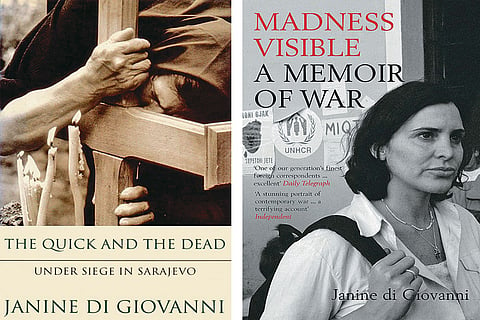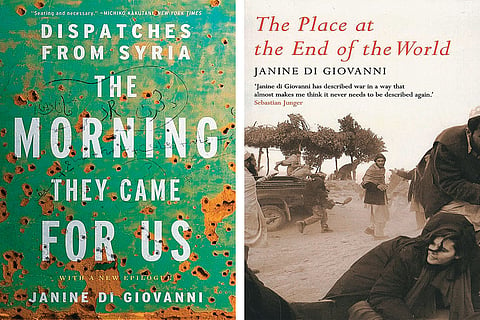“How do you write about war?” Janine di Giovanni repeats the question, pausing for a second. She is speaking over the phone from Paris where she lives with her young son, Luca Girodon. In a few days, she is scheduled for surgery. There is no trace of self-pity in her voice when she brings it up. It’s a fact, not a tragedy. “The most effective way to write about war is to tell the human story,” says the veteran journalist. “You try to find out how people survive; how families forage for food and keep kids warm. How they deal with unimaginable loss. War robs people of everything: homes and jobs, water, food, electricity. It brings disease and starvation and rips apart society, but in the midst of all that suffering, you also see tremendous stories of human strength.” Her mission has been to share these stories so people everywhere could put themselves in the shoes of those who live in war zones. Whether reporting from Syria or Lebanon, Sarajevo or Rwanda, she has always focused on sharing the human cost of war. The aim is to empathise, not sensationalise. To spend time with people whose lives are ruptured by violence, to write about the “small voices” that are often neglected.
How To Write On War? 'Empathise, Don't Sensationalise'
War correspondent Janine di Giovanni who has covered almost every major armed conflict worldwide since the 1990s speaks to Outlook about the importance of documenting the 'small voices' when reporting on war.
“Articles, books—everything I’ve written—is meant to help my readers experience what it actually feels like to be in a war zone, what life is like there,” she says. She is a staunch believer in the power of human rights reporting. This keeps her going in a world that is perpetually at war.
The war in Gaza leaves her distraught. “So many Palestinians have become homeless,” she says. “People are starving; they don’t have blankets to shield themselves from the cold. Pregnant women give birth without anaesthetics because of a shortage.” Women, she points out, are the first casualty of any war. They are at “the frontline of suffering” and sexual violence and rape are used as weapons against them. In 2023, the proportion of women killed in armed conflicts doubled compared to 2022. Four out of every ten people who died due to conflict in 2023 were women. United Nations-verified cases of conflict-related sexual violence increased by 50 per cent. “All wars are alike,” Giovanni says. “It all comes down to power and the need to control territory.”
Did she always want to be a war correspondent? Born into a large Italian-American family in New Jersey, she had dreams of being a writer from the start. Reading was an addiction; poetry and fiction a true joy. So, after completing her undergraduate degree from the University of Maine, she joined the Iowa Writers Workshop to pursue a degree in Creative Writing (in fiction, not non-fiction). Post graduation, she moved to London where she got a degree in Comparative Literature because at that point, academia seemed like an option. But the road not taken beckoned when she met Jewish Israeli lawyer Felicia Langer, who defended Palestinians. Langer took her to the West Bank. That journey with the crusading advocate was life-changing. Shaken and deeply moved by the stories she heard from the people in the refugee camps, Giovanni wrote an article, which caught a London literary agent’s eye. At 26, she was offered a book deal to write about the occupied territories. She said yes, packed her bags, headed to the West Bank. And that was the start of her trail-blazing journalistic career.


A lifetime of war reporting has taught Giovanni many lessons. She has seen human nature at its best. And its depraved worst. As a journalist and academic, she spent years documenting human rights abuses in Syria and the horrific violations committed by the Assads. Reporting from Taliban-controlled territory in Afghanistan in 2001, she wrote in a Vanity Fair piece, “I have never been in a place so stained with its own blood. And all we are doing, all we can do, is stop the bleeding.”
As a war reporter, Janine Di Giovanni has witnessed unimaginable human suffering as well as everyday acts of kindness.
She has borne witness to unimaginable human suffering as well as everyday acts of kindness. People risking their own lives to rescue the wounded in war time, neighbours looking out for each other when bombs come raining down, the displaced sheltering under bridges and leaky tents, sharing food and water without hesitation. In Rwanda, she has seen bodies pile up on the streets. Stumbled on mass graves in Bosnia and Africa. She’s dodged bullets and bombs, had many hairbreadth escapes. In her memoir, Ghosts by Daylight: A Memoir of War and Love, she writes candidly about the struggle to lead an ordinary, civilian life with her husband Bruno after all this. The two first met—and fell in love—as young reporters when they were both covering the siege of Sarajevo. After many years, and many wars, they decided to settle down in Paris as a couple. But marriage and parenthood didn’t run a smooth course as they grappled with PTSD and Bruno’s alcohol addiction. Eventually, the realisation dawned: they love each other, but they can’t live together. War had left deep imprints on them. The scars were practically impossible to shed.
Has experience hardened her? Turned her into a cynic who thinks a peaceful world is impossible? “I don’t see an end to war in my lifetime,” she says, dreading the prospect that in the time of climate change, more wars will be fought over water, resources, turf. The rise of undemocratic leaders in many places across the globe also alarms her. “People who suffer wartime atrocities deserve to get justice,” she stresses. “Someone needs to recognise what happened to them and make sure the world doesn’t forget.” The Reckoning Project, which she directs, gathers legally admissible testimonies documenting war crimes in Ukraine, to ensure that perpetrators are held to account, which rarely happens. The Project’s team documents the testimonies of the affected so that no one can deny later that these crimes happened. It lets people tell their stories in their own voices, giving them a measure of agency when war leaves them helpless.
Conflict has become a constant. The world seems to be on fire all the time. Are we destined to live with never-ending wars? “This is happening because fundamental issues are not addressed,” Giovanni says. “For example, Palestine is occupied by Israel and there is no semblance of equal rights…We live in the grimmest of times I’ve ever seen,” she sighs, but is quick to add, “Despite all the wars, I am optimistic. I believe in working for restorative justice and healing. There is still beauty left in the world and I look for it.”
(This appeared in the print as 'The Place At The End Of The World')